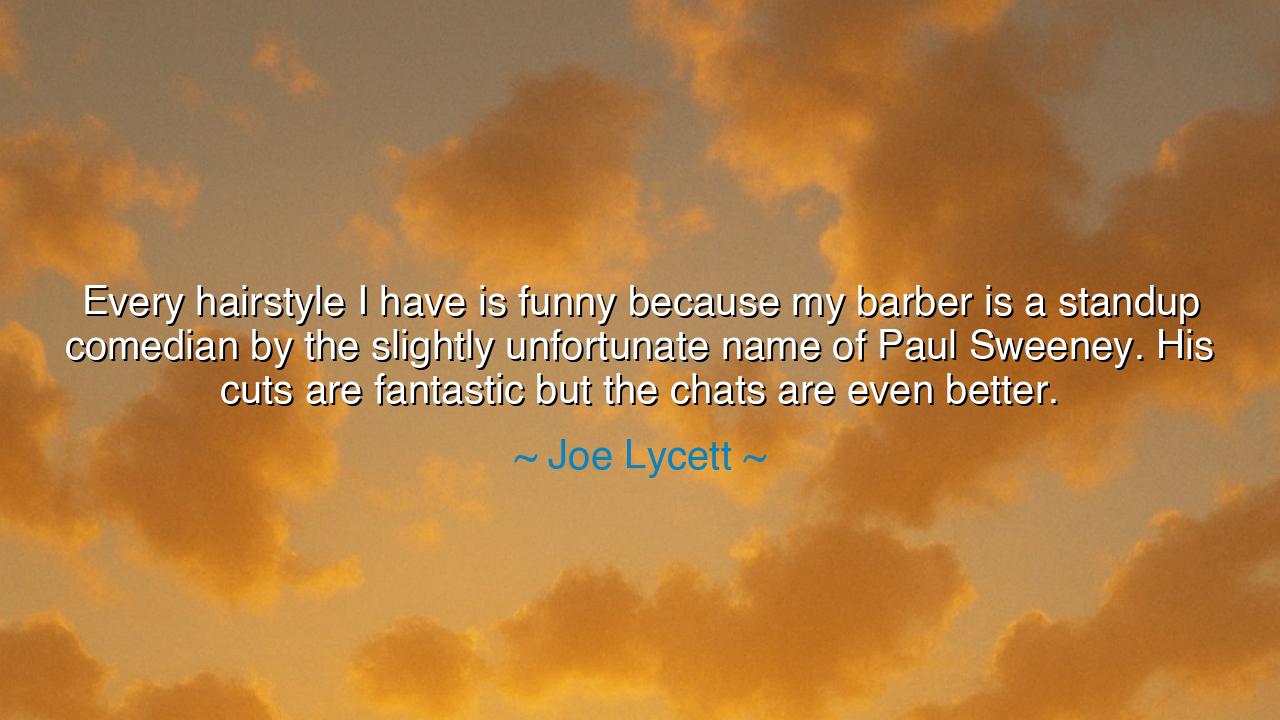
Every hairstyle I have is funny because my barber is a standup
Every hairstyle I have is funny because my barber is a standup comedian by the slightly unfortunate name of Paul Sweeney. His cuts are fantastic but the chats are even better.






When Joe Lycett said, “Every hairstyle I have is funny because my barber is a stand-up comedian by the slightly unfortunate name of Paul Sweeney. His cuts are fantastic but the chats are even better,” he was not merely making a jest about haircuts — he was revealing a quiet philosophy of joy. His words, though playful, contain a timeless lesson: that the ordinary moments of life, when shared with humor and warmth, can become sacred. The barber’s chair, that humble place of grooming, becomes in his telling a temple of laughter, where wit is as sharp as the scissors and where connection is the true craft.
The origin of this reflection lies in Lycett’s own life — a comedian whose art thrives on finding delight in the everyday, and whose humor transforms the banal into the beautiful. The image of the barber, the artist of hair, mirrors the role of the comedian — both sculptors of confidence, both healers in disguise. The barber’s “fantastic cuts” serve the body, but the “even better chats” serve the soul. Beneath Lycett’s jest lies an ancient truth: that the true measure of artistry is not found in perfection, but in the laughter, comfort, and humanity one leaves behind.
The ancients themselves honored this balance between craft and companionship. In the agora of Athens, the shoemaker or potter was as much a philosopher as the scholar, for conversation flowed wherever hands were busy. The Stoic teacher Epictetus once said that wisdom is not bound to temples or scrolls but lives in the dialogues of daily life — in the honest exchange between friends and strangers. In the same way, Lycett’s barber, Paul Sweeney, becomes a sage of the modern world: his humor a philosophy, his salon a sanctuary where laughter replaces doctrine. Through their exchanges, the ordinary becomes luminous, and humor becomes a form of shared enlightenment.
Yet there is something deeper still in Lycett’s tone — a recognition that joy often arrives where we least expect it. He speaks not of grand stages or roaring audiences, but of a small shop, a pair of scissors, and two people sharing stories. It reminds us that meaning does not always dwell in grandeur. Just as the philosopher Diogenes lived in a barrel yet taught kings, so too can wisdom reside in the unlikeliest of places — even in a haircut. Lycett’s laughter in the barber’s chair becomes a meditation on gratitude, a reminder that life’s sweetness is found in its smallest exchanges.
There is also humility in his words. He gives his barber the spotlight, acknowledging another comedian, perhaps lesser known, with the affection of equals. This humility is ancient in spirit — like the artist Michelangelo, who said that his sculptures already existed within the marble and that he merely freed them. Lycett, too, honors the unseen artist — his barber — whose work, though ephemeral, brings beauty and laughter to the world. It is a lesson in recognition, in remembering those whose gifts shape our days in quiet ways.
But Lycett’s humor also carries a gentle irony: “Every hairstyle I have is funny.” Beneath the surface of this jest lies an understanding that self-deprecation is a form of strength. To laugh at oneself is to stand unshaken before the world’s gaze. It is the laughter of Socrates, who claimed to know nothing and thus knew all. In embracing imperfection, Lycett transcends vanity — finding freedom in the ability to smile at one’s reflection. The hair may grow unevenly, but the laughter endures, and that, he implies, is the truest beauty.
So, dear listener, let this be your lesson: cherish the ordinary, seek joy in small encounters, and measure your days not by achievements but by shared laughter. Find the philosopher in your barber, the poet in your neighbor, the teacher in your friend. For life’s meaning is not always written in grand events but whispered through the humor of daily existence. And if your hair — or your life — sometimes appears ridiculous, smile. For it is in laughter, not perfection, that the divine reveals itself.
Thus, Joe Lycett’s words become a modern fable of connection — a reminder that art and humor dwell wherever humanity is honest and kind. Let us, then, carry his spirit: to find the “fantastic cuts” in our work, but to treasure even more the “better chats” — the laughter, the understanding, the companionship that turns the simplest moments into the richest ones. For when the day ends, and the hair grows back, it is not the style we remember, but the joy we shared.






AAdministratorAdministrator
Welcome, honored guests. Please leave a comment, we will respond soon